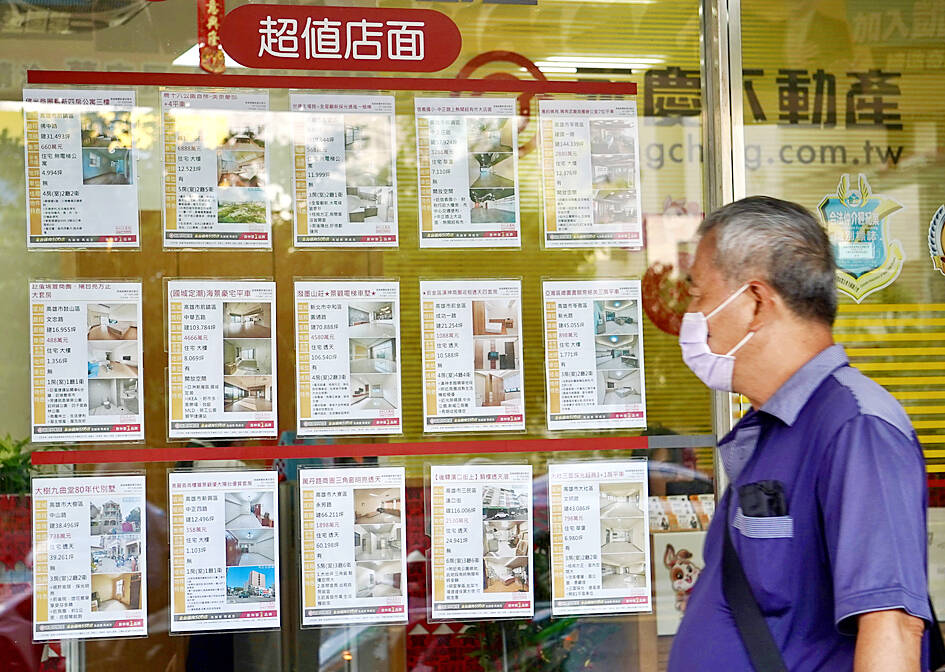The nation’s major housing brokers this month reported a slump in transactions year-on-year despite a pickup from last month, as loan restrictions and economic uncertainty dampened buying interest.
Evertrust Rehouse Co (永慶房屋), the nation’s largest property broker by number of offices, said it observed a 41 percent retreat in deals and the slowdown hit every major region.
Transactions tumbled 35 percent in Taipei, 39 percent in New Taipei City, 47 percent in Taoyuan, 49 percent in Hsinchu, 44 percent in Taichung, 38 percent in Tainan and 40 percent in Kaohsiung, the broker said, citing internal data.

Photo: CNA
Evertrust deputy research head Chen Chin-ping (陳金萍) attributed the poor showing to economic headwinds, the central bank’s credit controls and a high base.
The housing market approached its peak in May last year on the back of supportive policy measures and inflation expectations, she said.
Buyers have turned conservative even though the US and China have agreed to a 90-day truce in tariff exchanges that would allow transactions to pick up compared with last month, Chen said.
However, buyer confidence recovered only modestly as uncertainties linked to tariffs linger and mortgage loans remain difficult to obtain, Chen added.
“The absence of a long-term agreement continues to cast a shadow over the property market,” Chen said.
Taiwan is vulnerable to fluctuations in global trade and a slowdown in key trading partners could weigh on its economic growth, affecting job stability and household income — two critical factors for buyers, Chen said.
Likewise, H&B Realty Co (住商不動產), the nation’s largest broker by number of franchises, said that transactions in its network constituted only half of the volume recorded in May last year, despite there being more working days in the month this year.
Buying interest remained soft, although some homeowners — especially those selling old apartments or less desirable properties — lowered their asking prices to facilitate deals, H&B chief researcher Jessica Hsu (徐佳馨) said, adding that the situation is unlikely to turn around in the short term.
Deals tumbled 51.1 percent in New Taipei City, 52.7 percent in Taoyuan and 47.9 percent in Kaohsiung, Hsu said.
Pre-sale home deliveries in northern Taiwan added to supply, but buyers preferred to wait and see, she said.
Chinatrust Real Estate Co (中信房屋) shared a similarly bleak report after transactions at its network declined 30.8 percent this month from a year earlier.
The downtrend is consistent across the six major municipalities: deals slumped 28.3 percent in Taipei, 33.3 percent in New Taipei City, 27.7 percent in Taoyuan, 28.9 percent in Taichung, 32.8 percent in Tainan and 36.7 percent in Kaohsiung, the broker said.
Chinatrust recommended that people prioritize buying a home for self-occupancy and carefully assess their financial standing, as the market is likely to consolidate for a while.
“It is wise to avoid rushing into the market or blindly chase high prices,” the broker said.

In Italy’s storied gold-making hubs, jewelers are reworking their designs to trim gold content as they race to blunt the effect of record prices and appeal to shoppers watching their budgets. Gold prices hit a record high on Thursday, surging near US$5,600 an ounce, more than double a year ago as geopolitical concerns and jitters over trade pushed investors toward the safe-haven asset. The rally is putting undue pressure on small artisans as they face mounting demands from customers, including international brands, to produce cheaper items, from signature pieces to wedding rings, according to interviews with four independent jewelers in Italy’s main

Japanese Prime Minister Sanae Takaichi has talked up the benefits of a weaker yen in a campaign speech, adopting a tone at odds with her finance ministry, which has refused to rule out any options to counter excessive foreign exchange volatility. Takaichi later softened her stance, saying she did not have a preference for the yen’s direction. “People say the weak yen is bad right now, but for export industries, it’s a major opportunity,” Takaichi said on Saturday at a rally for Liberal Democratic Party candidate Daishiro Yamagiwa in Kanagawa Prefecture ahead of a snap election on Sunday. “Whether it’s selling food or

CONCERNS: Tech companies investing in AI businesses that purchase their products have raised questions among investors that they are artificially propping up demand Nvidia Corp chief executive officer Jensen Huang (黃仁勳) on Saturday said that the company would be participating in OpenAI’s latest funding round, describing it as potentially “the largest investment we’ve ever made.” “We will invest a great deal of money,” Huang told reporters while visiting Taipei. “I believe in OpenAI. The work that they do is incredible. They’re one of the most consequential companies of our time.” Huang did not say exactly how much Nvidia might contribute, but described the investment as “huge.” “Let Sam announce how much he’s going to raise — it’s for him to decide,” Huang said, referring to OpenAI

The global server market is expected to grow 12.8 percent annually this year, with artificial intelligence (AI) servers projected to account for 16.5 percent, driven by continued investment in AI infrastructure by major cloud service providers (CSPs), market researcher TrendForce Corp (集邦科技) said yesterday. Global AI server shipments this year are expected to increase 28 percent year-on-year to more than 2.7 million units, driven by sustained demand from CSPs and government sovereign cloud projects, TrendForce analyst Frank Kung (龔明德) told the Taipei Times. Demand for GPU-based AI servers, including Nvidia Corp’s GB and Vera Rubin rack systems, is expected to remain high,